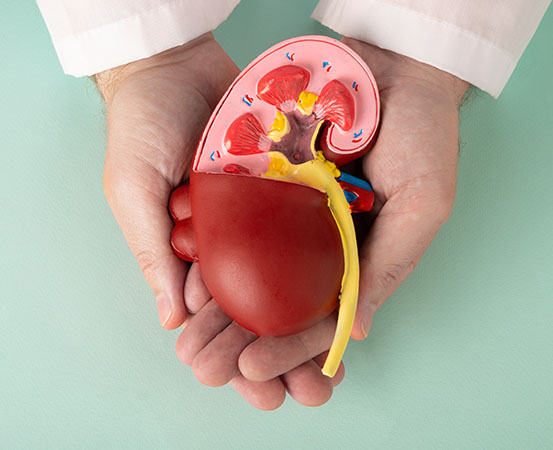
It came as a shock for Lakshmi Acharya, a 53-year-old homemaker from Mangaluru when she was told she had reached end stage renal disorder. Unfortunately, her husband who volunteered to donate a kidney for her was not an ideal donor for her. But a conversation between two nephrologists made a kidney swap transplant possible, saving Lakshmi’s life.
While Lakshmi’s husband was not an ideal donor for her, his kidney was a perfect match for another family in need of a transplant and the latter family’s willing donor’s kidney was a perfect match for Lakshmi. The kidney swap transplant between the two hospitals in Bengaluru gave fresh lease of life for two people with renal disorders.
READ MORE :
How genetic testing helps in diagnosing and treating kidney diseases
Undergoing dialysis? Know how nutrition and diet help you
Managing phosphorus levels in people with CKD
Kidney transplant checklist: Factors to consider
Swap kidney transplant: What is cross matching?
The test that decides an ideal kidney donor-recipient match is the cross-match test. The antigens of the blood sample present in the prospective donor and recipient have to match and that’s what the test examines. If the test result is positive, then the transplant between the two is not encouraged.
Dr Anil Kumar BT, Head of Department and Senior Consultant – Nephrologist & Transplant Physician from BGS Gleneagles Global Hospital, who treated Lakshmi, explains what a positive cross-match test result is.
In a cross-match test, the white blood cells of the recipient are mixed with the serum of the willing donor, in a lab. If the recipient’s antibodies kill the donor’s cells, then the result is said to be positive and the transplant is not encouraged as it is a sign of organ rejection. The result is negative when the recipient’s antibodies do not attack the donor’s cells and hence transplant can be done.
Explaining the positive result which was seen in the cross-match test between Lakshmi and her husband, Dr Anil said that there was possible rejection of the kidney. “In Lakshmi’s case, even after we desensitised her (reducing the antibodies from the blood), the crossmatch tests were positive,” he says.
Finding the right cross-match
While Lakshmi was struggling, Rudra Prasad, a 39-year-old driver from Bengaluru was also in a similar situation. He was suffering from renal failure and was being treated by Dr Sanjay. Prasad’s father Shivashankarappa was found to be a matching donor for Lakshmi. Similarly, Lakshmi’s husband Shreesha was an ideal donor for Prasad. The families agreed to help each other and carried out the legal formalities. Both families met and were counselled for a proposed kidney transplant, to which they agreed. The swap transplant took place in December 2022.
Though the doctors say the result of the cross-match is a major determining factor for the transplant, interestingly all four had the same blood group, O positive.
A swap transplant involves two families with two recipients and two donors. “It is the exchange of paired kidneys among two pairs of related donors and recipients. When the kidney of the donor of the first pair is not compatible with the recipient due to blood group mismatch or cross-match positivity status, their kidney will be transplanted to the recipient of the second pair and vice versa,” says Dr Sanjay S, HOD, department of Nephrology in Suguna hospital in Bengaluru.
Swap kidney transplant is a boon for many families as a cadaver kidney transplant (from a brain dead donor) takes nearly 3-5 years, say doctors.
Dr Sanjay further adds that the kidney swap transplant surgery was like that of a regular transplant procedure. “However, the procedures of harvesting the kidney from the donors and transplanting to the recipients must take place in both hospitals at the same time. The donor can change his or her mind at the last minute, which would become a legal issue as we cannot force them,” says Dr Sanjay. The surgery was coordinated on call between both doctors.
“There is no specific stage at which the person with CKD needs to have the kidney swap transplant. If it is convenient for both hospitals, we can go ahead with it,” says Dr Anil.
It has been nearly two months since post-transplant. Both Lakshmi and Prasad are doing well. They are currently advised to be on immunosuppressants and to stay away from crowds to prevent infection.
“My mother’s energy levels have slowly become better as she does not have to be on dialysis anymore. She is feeling much healthier,” says Srihari. He also shares that his father Shreesha is also doing relatively well.
It’s all smiles at the other family too. Prasad is recovering well, said Dr Sanjay.
Takeaways
- If a cross-match test is positive the recipient’s antibodies fight against the donor’s antibodies, thus implying a possible organ rejection.
- A kidney swap is recommended when among both families the cross match test is positive.
- A kidney swap transplant involves the exchange of kidneys among related donors and recipients from two different families if their cross match test is negative.
- A kidney swap transplant must take place at the same time at both hospitals.


















One Response
I don’t have donor